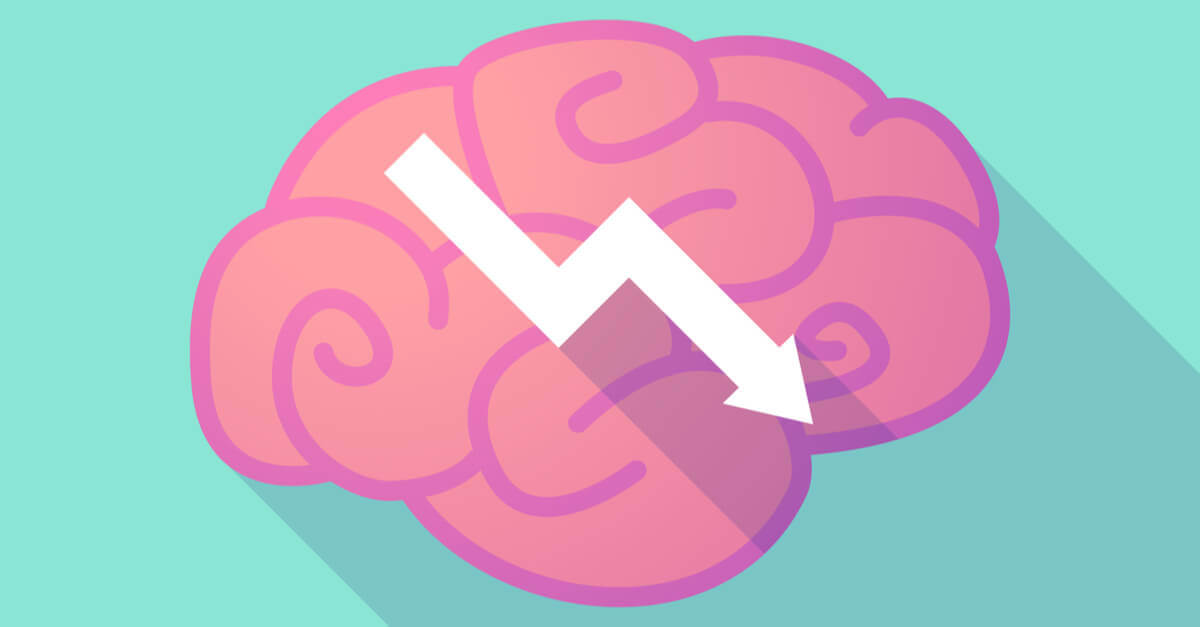
Can Negative Thinking Hurt Your Brain? New Insights Into Cognitive Decline and Dementia Risk


Last Updated July 3, 2025
Can Negative Thinking Hurt Your Brain?
It’s no secret that negative thoughts are related to mental health conditions like depression and anxiety; in fact they’re pretty much required for diagnosis. We also know that depression and anxiety can increase your risk for dementia, including Alzheimer’s disease.
Of course, not all negative thinking leads to depression. There’s nothing inherently detrimental about negative thoughts — everyone needs to have some negative thoughts on occasion. We’re biologically equipped to handle a certain amount of negativity.
But as with most systems, it works under tight parameters. Taxing the system can throw it off balance. And when we get stuck in depressed rumination or anxious worry loops, we put ourselves at risk for physical health effects.
Repetitive negative thinking, it turns out, can lead to depression… but it also increases one’s risk for dementia all on its own.
Repetitive Negative Thinking and Dementia Risk
Although researchers have been aware of a relationship between depression or anxiety and dementia, the direction of the relationship wasn’t clear. Did depression or dementia come first? Or was there a third factor that affected them both?
In a recent study examining the effects of negative thinking on cognition, nearly 300 people aged 55 and over were tested and monitored over two years. Researchers measured cognitive skills such as attention, spatial cognition, language, and memory, as well as physical markers for cognitive decline. These markers included tau and amyloid proteins; higher levels of these proteins have been observed in patients with Alzheimer’s Disease (AD).
Are You At Risk of Developing Alzheimer’s Disease?
Learn how a blood test available at Aviv Clinics may be able to answer that question: pTau Testing
These cognitive factors were measured against the tendency to engage in repetitive negative thinking (RNT). The researchers found that RNT was causally associated with:
- A more rapid decline in global cognition
- A more rapid decline in immediate and delayed memory
- Higher levels of AD biomarkers (tau and amyloid proteins)
Repetitive Negative Thinking and Cognitive Debt
This study squares well with research that emerged in 2015 on the theory of “cognitive debt“. Depression, anxiety, PTSD, and other factors may contribute to cognitive decline and memory issues over a long, cumulative process.
The researchers proposed the theory of cognitive debt to explain how our thoughts and behaviors can lead to cognitive decline. They recognized that several related, but distinct, conditions (depression, anxiety, life stress, neuroticism, sleep disturbances, and PTSD) all shared increased risk factors for dementia.
But what precisely do they all have in common? The answer is Repetitive Negative Thinking.
The authors defined the term RNT to include both rumination (negative thoughts regarding past events) as well as worrying (typically future-related thoughts). They emphasized that the repetitive and negative nature of the thoughts, NOT their temporal nature, was key to the association.
Why?
The stress system gets chronically engaged due to RNT and accrues cognitive debt by affecting where your attention is focused.
The Brain’s Built-in Negativity Bias

Maybe you’ve been told before to just “look on the bright side” or “find the silver lining,” but somehow you end up still focusing on the negative. If that’s you, don’t feel discouraged. Humans come pre-equipped with a natural negativity bias.
Research has repeatedly shown that we’re more responsive to negative stimuli in the environment than positive stimuli. When making decisions, we tend to weigh the cons more heavily than the pros. In studies examining how we arrive at our impressions of others, the participants relied more on the negative traits when forming first impressions, even if positive traits were similarly intense.
That’s because our brains, which are constantly scanning the environment for potential threats, essentially throw away much of the positive data before it even reaches “you.”
Why would it do this? A few reasons.
Your Brain is Wired for Survival, Not Positivity
One of the main jobs of the brain is to act as a filter for stimuli coming from the physical world. Your brain is constantly bombarded with raw data: sights, sounds, and other incoming information. Only a fraction of this data ever reaches your conscious awareness, lest you be completely overwhelmed. The brain is forced to pick and choose what to let through and what to toss away.
Second, negative and positive information isn’t equally weighted from the brain’s perspective.
Consider your distant prehistoric ancestor foraging for edible berries, suddenly happening upon a ferocious wild animal looking for lunch. Recognizing a threat to survival, her brain directs her to hightail it back home. Do you think she had an opportunity to notice the beautiful sunset in the distance as she ran for her life?
Your brain isn’t in the business of being fair to reality. It doesn’t even distinguish between “good” and “bad” or make moral judgments. It’s distinguishing between things that need your attention and things that don’t.
In other words, it’s trying to keep you alive.
It’s human nature to filter out some of the positives. The good news is that while your subconscious brain may have designs on the negative, that’s just the default setting on your autopilot system.
In other words, you have the option to chart your own course.
Most of Your Thinking is Habitual — and That Matters
Researchers estimate that up to 95% of human activity is driven by the unconscious brain. Our brains are efficient, and consciousness is expensive, metabolically speaking. So if your brain detects a pattern (such as driving the same route to work every day), it’ll simply automate that for you, taking it off of your cognitive plate.
In other words, it forms a habit.
That means that 95% of the time, your brain is relying on your habits: past information, thoughts, and behaviors that you frequently engage in. Most of the time, you’re not actively deciding the course of your life.
How to Interrupt Negative Thought Loops
We do have the power to choose to take the wheel when it comes to negative thinking. By doing so, we can construct a more positive reality for ourselves.
We may not be able to fight biology and always be in the moment. But you can reprogram your autopilot so that it takes you where you want to go. With some tweaking, your autopilot can work for you, not against you.
It starts with choosing what to “feed” your brain. Whatever your brain experiences most will shape your unconscious, and thereby your thoughts and behaviors.
Take the idea of doomscrolling, which became so popular during the COVID pandemic that Merriam-Webster added it to the list of “words we’re watching.” Doomscrolling involves “the tendency to continue to surf or scroll through bad news, even though that news is saddening, disheartening, or depressing.”
What happens to a brain that’s exposed to hours of negative thoughts? Like a carrot in a stew absorbs the flavors of all the other ingredients, your brain soaks up all the elements of the environment around you: sights, sounds, thoughts, and emotions. It’s no surprise that doomscrolling can lead to patterns of negative thinking.
Train Your Brain to Think Differently
You can’t choose all of your thoughts, but you can choose what you’re exposed to. The more intentional you are with your environment, the more you can reprogram your brain. Here are a few ways to get started.

- Choose your circle. Humans are social animals, and if you surround yourself with negative people, you’re more likely to adopt negative thinking.
- Cultivate mindfulness. Before you can change anything, you have to be aware of it. On average, we may only be truly conscious and aware 5% of the time, but mindfulness can raise that number. Meditation and other mindfulness strategies are great for catching negative thinking in the act.
- Try cognitive reframing or reappraisal. If you’re able (using mindfulness) to catch a negative thought in the act, you can try reframing it. The idea isn’t to sugar coat anything, ignore or dismiss the negative, or invalidate feelings, because you’re grounded in reality–the idea is to question your assumptions and logic and consider if it’s worth rethinking. Try to approach it like a scientist, with nonjudgmental curiosity.
You might do the following once you’ve identified a troubling thought:
- Stop and observe the thought
- Consider the available evidence for the thought
- Question what emotions might be associated with the thought
- Consider that alternatives to this thought might exist
- Look out for thinking traps, but don’t blame yourself for falling into them–they’re traps, after all!
The Bottom Line: Change Your Thinking, Protect Your Brain
Left to our devices, humans tend towards the negative by nature. This gets programmed into our unconscious, and so we continue towards the negative — unless you choose to take steps against it.
Aviv Clinics combines neuropsychology with hyperbaric oxygen therapy and other personalized interventions to promote better brain health and cognitive resilience. As the only U.S. location offering the unique, evidence-based Aviv Medical Program, Aviv Clinics in central Florida empowers you to optimize your brain health with lasting results.
Based on nearly two decades of research and development, the intensive treatment program is customized to each client’s needs. Using in-depth assessments, our physicians prescribe a personalized plan for each client.
For a free consultation with one of our board-certified physicians, contact us.
Aviv Medical Program provides you with a unique opportunity to invest in your health while you age

